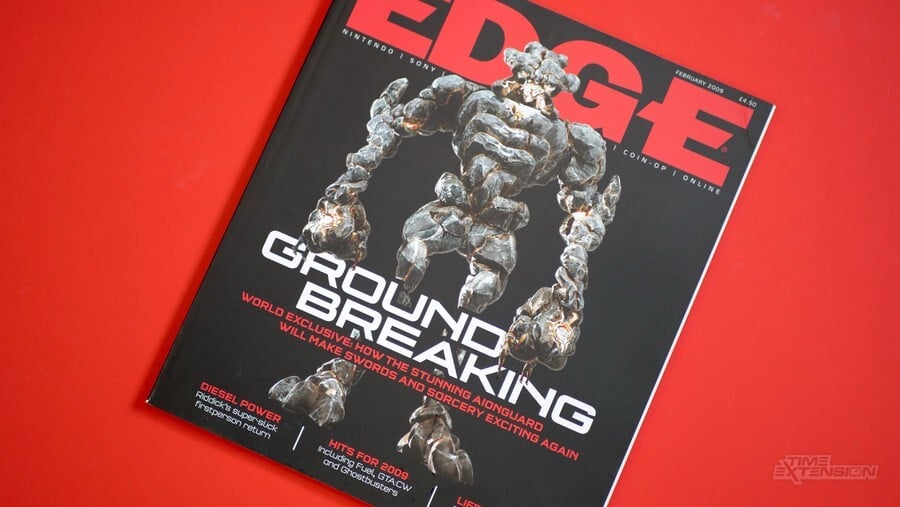
If you were a subscriber to EDGE magazine back in 2009, you may remember reading about AionGuard — Avalanche Studio's cancelled fantasy role-playing game for PS3 and Xbox 360 that was reportedly on a mission to make "sword and sorcery exciting again."
The game graced the cover of the February 2009 issue and was subject to an expansive 8-page feature, which contained a bunch of exciting screenshots alongside interviews with Avalanche Studios founder Christofer Sundberg and the narrative director Odd Ahlgren.
In these interviews, Ahlgren described it as "a melting-pot of science-fiction, steampunk, technology, fascism, mystery and games from the excellent Panzer Dragoon Orta to the failed experiment of Lair". Meanwhile, Sundberg gave a brief history of the project, claiming that it had actually started life a few years earlier at a big publisher, changing from "a huge war game" to "a science-fiction game" to "fantasy" before Avalanche bought back the rights to try to shop it around elsewhere.
It seems Avalanche's plan at the time had been to sign a new deal based on the publicity generated by the article, but the idea appears to have backfired, and in 2010, the company announced that AionGuard had been put on hold, with Sundberg later blaming the EDGE feature for hindering negotiations with publishers.
Looking online, most sources seem to suggest that EIDOS was the original publisher of this game, but recently, while speaking to the former Disney Interactive employee Martin Alltimes, he revealed to us that it was actually Disney that was funding the project, and gave us a little bit more insight into the early days of AionGuard from before the EDGE article was published.
According to him, the main reason why Disney dropped the project was because of a regime change inside the company that saw the House of Mouse getting cold feet over its initiative to create more mature titles.
Alltimes recalls, "When I joined Disney [in 2005], Michael Eisner was in charge. Michael Eisner said, 'We own the kid's business, we just need to optimize it. We need to go out and be like every other media organization, and cater to kids, adults, whatever.' And that had been the strategy for ABC and Miramax. And so we were gonna be like Activision or EA, we were gonna go out and make loads of games. So that's the reason we signed Turok.
I remember, even like within three months of being there, it was like the CEO changed, right? The CEO was now Bob Iger, and I'd read DisneyWar. And it basically said, you know, Eisner had been kicked out because he diluted the Disney brand
"And I remember, even like within three months of being there, it was like the CEO changed, right? The CEO was now Bob Iger, and I'd read DisneyWar, which is a really good book worth reading. And it basically said, you know, Eisner had been kicked out because he diluted the Disney brand. And Bob Iger was coming in to make Disney front and center. But anyway, we'd started this game. And the manager was saying, 'No, no, don't worry about that.'"
As Alltimes remembers, while all this was going on in the background, Avalanche continued putting together the finishing touches to a demo of the game and eventually presented it to Disney. Alltimes now calls this one of the best demos he's ever seen.
He remembers, "You were fighting armies of hundreds of people with super-powered characters. It was basically a fantasy GTA, in the Avalanche Engine. The original demo had this character going through magic, bringing down boulders on top of things, hitting people with spells, freezing massive dragons and shattering them, and then he jumped on his own dragon, flew off into the air, and then flew down on these massive armies. It was mind-blowing. I mean, no one had ever seen it anywhere before. But what happened was the management was saying, 'It's a bit dark. Can you lighten it a bit?' And it's like, 'What does that mean?'
"We did try doing it, and eventually, you know, it started to look like a Disney princess. And the management was saying, 'Well, if you don't change it, unfortunately, we're going to kill it.' And I said, 'Well, let's kill it because this is like death by a thousand cuts. We don't want to release this game. You signed this game under a different regime, and it's just going to be painful. But there's nothing in fantasy that I've seen that matched the original aspirations for that game. So if someone has got a spare 300 million, they should go and make that."
It's a shame that AionGuard never got the chance to enter full development, as at the very least, it would have been interesting to see what Avalanche's take on the genre would have been like and whether it would have lived up to the hype the studio was building around the project.
In the years since Avalanche was put on hold, sadly no footage of the game seems to have ever surfaced, with the screenshots and concept art included in the Edge article still being our best look at the direction the game was taking.





